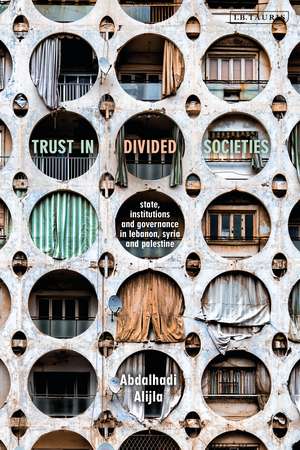Trust in Divided Societies: State, Institutions and Governance in Lebanon, Syria and Palestine
Autor Abdalhadi M. Alijlaen Limba Engleză Paperback – 18 mai 2022
| Toate formatele și edițiile | Preț | Express |
|---|---|---|
| Paperback (1) | 198.05 lei 6-8 săpt. | |
| Bloomsbury Publishing – 18 mai 2022 | 198.05 lei 6-8 săpt. | |
| Hardback (1) | 598.52 lei 6-8 săpt. | |
| Bloomsbury Publishing – 25 noi 2020 | 598.52 lei 6-8 săpt. |
Preț: 198.05 lei
Preț vechi: 258.02 lei
-23% Nou
Puncte Express: 297
Preț estimativ în valută:
37.90€ • 39.78$ • 31.45£
37.90€ • 39.78$ • 31.45£
Carte tipărită la comandă
Livrare economică 11-25 aprilie
Preluare comenzi: 021 569.72.76
Specificații
ISBN-13: 9780755641185
ISBN-10: 0755641183
Pagini: 256
Dimensiuni: 156 x 234 mm
Greutate: 0.35 kg
Editura: Bloomsbury Publishing
Colecția I.B.Tauris
Locul publicării:London, United Kingdom
ISBN-10: 0755641183
Pagini: 256
Dimensiuni: 156 x 234 mm
Greutate: 0.35 kg
Editura: Bloomsbury Publishing
Colecția I.B.Tauris
Locul publicării:London, United Kingdom
Caracteristici
Focuses on Lebanon, Palestine, and Syria, but uses cross-case study analysis from Bosnia and Herzegovina, Pakistan, Turkey, Macedonia, South Africa, Kyrgyzstan, and Iraq for comprehensive analysis
Notă biografică
Abdalhadi Alijla is post-doctoral fellow at the Orient Institute in Beirut (OIB), Lebanon and Co-Leader of Global Migration and Human Rights at the Global Young Academy, Germany. He also has the position of Associate Researcher and the Regional Manager of the Varieties of Democracy Institute at Gothenburg University for Gulf countries, and Associate Fellow at the Post-Conflict Research Center in Sarajevo, Bosnia and Herzegovina. He has been granted several awards and scholarships, including DAAD (2009), RLC Junior Scientist (2010), UNIMI (2012), ICCROM (2010), Saud AL-Babtin(2002) among others.
Cuprins
PrefaceChapter 1: IntroductionChapter 2: BetweenSocial Capital to Trust: Institutions, History and CulturesChapter 3: Broken windows: trust in divided societies Chapter 4: Trust Beyond MENA: Does Institutions Matter? Chapter 5: The Failure: Institutions, Corruption and Trust Chapter 6: Lebanon Gone Wrong: Inequality and Trust in LebanonChapter 7: Creating Hybrid society: Trust in PalestineChapter 8: Doomed After, Doomed Before Trust in SyriaChapter 9: Refugees in Divided Societies: Syrian in LebanonChapter 10: The Missing Virtue: ConclusionBibliographyAppendices
Recenzii
A welcome addition to political science literature ... an accomplished and accessible book.
This is a thought-provoking book that significantly contributes to the debate on the role of trust as a key factor in understanding the dynamics of war-torn societies. A major strength of this book is that it combines theory debate along with empirical evidence and statistics available in a number of case studies. The author's personal experience in several conflict cases like Lebanon, Bosnia, Syria, and Palestine has enriched the discussion and reflection on the understanding of trust in divided societies. It is an important book for students and scholars studying conflict resolution, political science, social psychology, and comparative studies.
Using the concept of trust as a lens, Abdalhadi Alijla has provided a clear and compelling analysis of governance in Lebanon, Syria and Palestine. His analysis is sharp and this book is necessary reading for anyone interested in politics and society in this region.
Despite the emphasis placed on the role of institutions as well as of societal trust in social science literature during the last decades, the Middle East and the Arab world have been largely neglected. This important contribution is therefore timely and fills a significant gap within research. This is particularly so because of its comparisons with other diverse and divided societies. Thus, the book provides us with in-depth case studies from Lebanon, Palestine and Syria but also produces valuable comparisons and generalizations, of importance to scholars and practitioners alike.
This is a thought-provoking book that significantly contributes to the debate on the role of trust as a key factor in understanding the dynamics of war-torn societies. A major strength of this book is that it combines theory debate along with empirical evidence and statistics available in a number of case studies. The author's personal experience in several conflict cases like Lebanon, Bosnia, Syria, and Palestine has enriched the discussion and reflection on the understanding of trust in divided societies. It is an important book for students and scholars studying conflict resolution, political science, social psychology, and comparative studies.
Using the concept of trust as a lens, Abdalhadi Alijla has provided a clear and compelling analysis of governance in Lebanon, Syria and Palestine. His analysis is sharp and this book is necessary reading for anyone interested in politics and society in this region.
Despite the emphasis placed on the role of institutions as well as of societal trust in social science literature during the last decades, the Middle East and the Arab world have been largely neglected. This important contribution is therefore timely and fills a significant gap within research. This is particularly so because of its comparisons with other diverse and divided societies. Thus, the book provides us with in-depth case studies from Lebanon, Palestine and Syria but also produces valuable comparisons and generalizations, of importance to scholars and practitioners alike.
